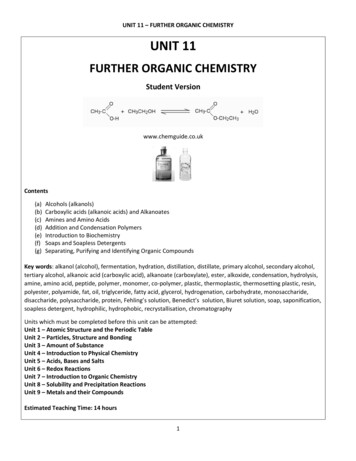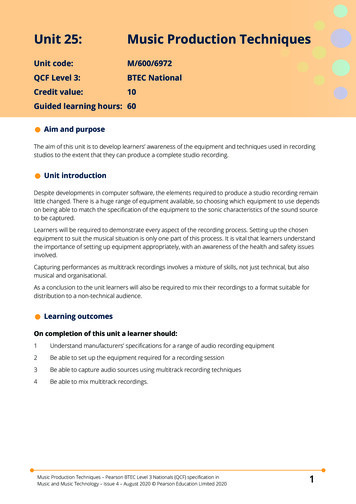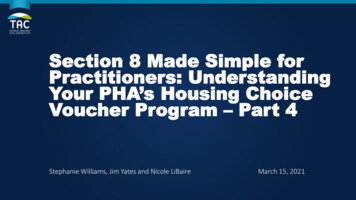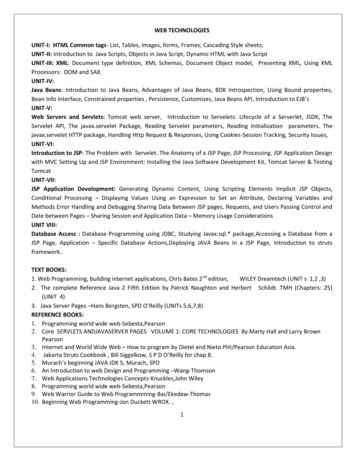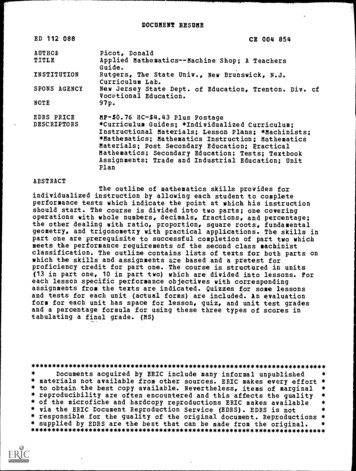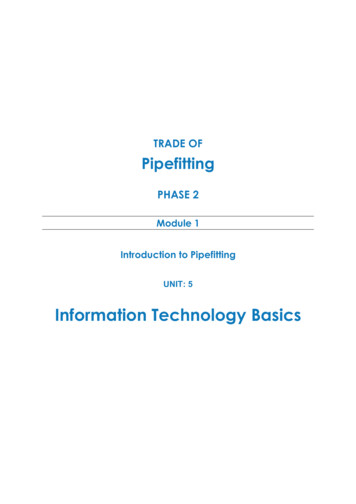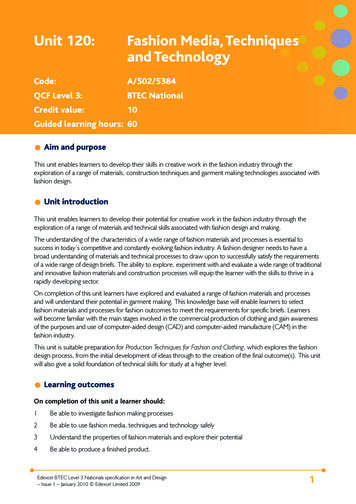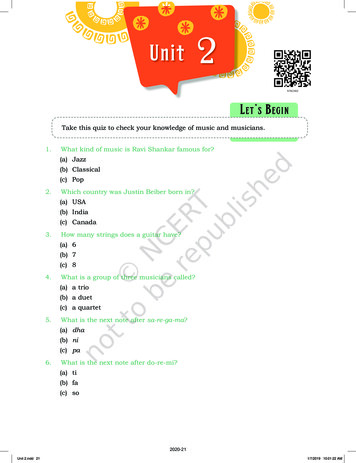
Transcription
Unit2L ET ’ S B EGINTake this quiz to check your knowledge of music and musicians.1.What kind of music is Ravi Shankar famous for?(a) Jazz(b) Classical(c) Pop2.Which country was Justin Beiber born in?(a) USA(b) India(c) Canada3.How many strings does a guitar have?(a) 6(b) 7(c) 84.What is a group of three musicians called?(a) a trio(b) a duet(c) a quartet5.What is the next note after sa-re-ga-ma?(a) dha(b) ni(c) pa6.What is the next note after do-re-mi?(a) ti(b) fa(c) so2020-21Unit 2.indd 211/7/2019 10:01:22 AM
NotesReading ComprehensionIn this section, you will read three texts on music in differentperspectives. The first one will enlighten you about theeffective role of music in our lives, the second reflects on thelife of the famous music composer, Ludwig van Beethoven,and the third is a poem by William Wordsworth where heappreciates the melody of a song.Read the texts carefully and answer the questions thatfollow.Text Iinescapable: unable to beavoided or deniedRole of Music in LifeToday, we are rushing through life and everyone seems tobe pressurised and stressed about one or the other thing.Stress has become an inescapable part of our lives. Manyof our illnesses are a result of stress, and to deal with it, weneed certain ways to relax our body and mind. Listening tomusic, particularly gentle, calming and melodious music,relaxes people both physically and mentally. Music releasesendorphins, the natural painkillers in our brain,which relieve us from the sense of pain. Musiccan normalise heart rate and blood pressure.The common occurrences of fatigue and boredomdecrease when we listen to music. It divertsour attention from everyday anxieties, therebyreducing the stress caused by such concerns.While meditating, listening to music helps us toconnect with our soul. Students can improve theirconcentration and boost their memory by listeningto soft music. Soothing music, when played atnight, helps us to rest and relax for a good night’ssleep. Listening to good music helps in overcomingnegative traits such as anger or worry, therebyimproving our personality. It creates positiveenergy and happiness. Every cell in the bodybecomes energetic with increased peace of mind.Music is a therapy for everyone — plants,birds, animals and human beings — to flourishand rejuvenate. It certainly plays an importantpart in making the world better for all living beings.22WordsandExpressions 12020-21Unit 2.indd 2230-05-2018 11:41:15
Complete the following statements by selecting the mostappropriate options given below.1.helps in relaxation of our body andmind.(a) Pop music(b) Soothing music(c) Jazz music(d) Rock music2.The natural painkillers released in our brain are.(a) Insulin(b) Endorphins(c) Endocrine(d) Glycerin3.Music is helpful in improving the ofstudents.Common suffixes thatmake nouns(a) concentration- ment(b) emotionagree—agreementmove—movement(c) relaxation-y(d) anxiety4.Fun factWhich word from the passage means the same as ‘torenew’?monarch —monarchydiscoverdiscovery—(a) rejuvenate(b) enhance(c) release(d) relieve5.List the benefits of music mentioned in the passage.23Unit 22020-21Unit 2.indd 2330-05-2018 11:41:15
Notesbeating the odds: to succeeddespite not having a goodchance of succeedingText IIBeating the OddsThe musical accomplishments of composer Ludwig vanBeethoven have been all the more remarkable for thefact that he lost his hearing ability from an early age. Hedeveloped the symptoms of tinnitus, a constant sound ofringing in his ears that made it difficult for him to hear. Heis compared to Mozart for his genius, and is considered themost eminent musician after Mozart.Although his formal education never went beyond theelementary level, he trained in music under Joseph Haydn.He has always been acclaimed as a brilliant piano maestro.His father and grandfather were the court musicians of aGerman prince. Young Ludwig was often made to perform forhis father’s drinking companions in the middle of the night,and was even beaten if he protested.For the first thirty years of his life, Beethoven could listento and play music effortlessly. As a result, he understoodsounds of musical instruments and the pitch of the singingvoices. He knew the harmony between music and singingbefore he became completely deaf. His deafness was notsudden, but a gradual decline. This slow process of losing hishearing activated his mind to imaginehow his compositions would soundlike. When he became completely deaf,he started to observe the vibrations ofthe piano. The observations helped himrealise that he could not hear the highnotes of the piano. To be able to hearhis own compositions, he sawed off thelegs of his piano. The piano touchedthe floor, and Beethoven would presshis ear to the floor, banging the pianokeys to listen to the high notes in hiscompositions.The most significant aspect ofBeethoven’s character was that hedid not give up. With a brave heart,he confronted the greatest challenge24WordsandExpressions 12020-21Unit 2.indd 2430-05-2018 11:41:15
a musician can face, and continued living his dream ofcomposing music. Deafness could not deter him fromachieving the pinnacle of musical success. He fought againstthe greatest obstacle and won.His quality of ‘never giving up’ strengthened him. Itmade him come to terms with his deafness in a dynamicand constructive way. These qualities led him to become afamous composer.1.pinnacle: the mostsuccessful pointRead the following statements and write true (T) orfalse (F).(a) Although he composed a lot of music, Beethovennever learned to play music himself. (T/F)(b) His deafness was not a sudden loss of hearing.(T/F)(c) He composed most of his music early in his life,before he became deaf. (T/F)(d) His musical skills were compared to Haydn. (T/F)(e) Beethoven cut down the legs of his piano to hearthe notes of the keys from the floor. (T/F)2.How could Beethoven compose music despite his lossof hearing?Fun factCommon Spelling ErrorsIt’s “tomorrow”, not “tommorrow”.It’s “noticeable”, not “noticable”.3.What realisation made Beethoven continue his passionfor music with more determination?25Unit 22020-21Unit 2.indd 2530-05-2018 11:41:15
4.Which word in the following is similar in meaning to‘skillful’ (para 1)?(a) brilliant(b) masterly(c) talented(d) geniusText IIIRead the poem carefully and answer the question thatfollows.profound: very great orintensechaunt: old British spellingof chant; a repeated rhythmicphrasethe solitaRy ReapeRBehold her, single in the field,Yon solitary Highland lass!Reaping and singing by herself;Stop here, or gently pass!Alone she cuts and binds the grain,And sings a melancholy strain;O listen! for the Vale profoundIs overflowing with the sound.No Nightingale did ever chauntMore welcome notes to weary bandsOf travellers in some shady haunt,Among Arabian sands:A voice so thrilling ne’er was heardIn spring-time from the Cuckoo-bird,Breaking the silence of the seasAmong the farthest Hebrides.Will no one tell me what she sings?Perhaps the plaintive numbers flowFor old, unhappy, far-off things,And battles long ago:Or is it some more humble lay,Familiar matter of to-day?Some natural sorrow, loss, or pain,That has been, and may be again?26WORDSANDEXPRESSIONS 12020-21Unit 2.indd 2630-05-2018 11:41:16
Whate’er the theme, the Maiden sangAs if her song could have no ending;I saw her singing at her work,And o’er the sickle bending;I listened, motionless and still;And, as I mounted up the hill,The music in my heart I bore,Long after it was heard no more.—William Wordsworth1.Complete the summary of the poem given below with asuitable word/phrase in each blank.ThepoetfindsayoungHighlandgirlwho(a) alone and sings to herself. The poet asksus to listen carefully, because the whole (b)is filled with the overflowing sound of her singing. He asksus to either (c) and listen to her sad song, orgently pass by so as not to disturb her.He goes on to say that no nightingale ever sang a more(d) song to bands of tired (e)in the Arabian Desert. The poet asserts that the beautyof the girl’s singing exceeds that of the cuckoo’s in the(f) . Her singing is also the only thing which(g) the silence of the valley.The poet tries to (h) what the girl issinging about. He is unable to get the words of the songFun factThat chair is not BROKE.That chair is BROKEN. You,however, might be BROKEif you can’t afford to fix thechair that’s BROKEN.clearly. He thinks that perhaps she is singing about oldsorrows or (i) fought long ago, or moreroutine concerns of life or even some (j)which she has endured and may endure again.At the end, he quietly walks away with a feeling thathe may never be able to find out the (k) ofher never-ending song. Nevertheless, he asserts that hersinging has captured his imagination so much that he will(l) the music in his heart long after it isheard no more.27Unit 22020-21Unit 2.indd 2730-05-2018 11:41:16
Vocabulary1. The following words and phrases occur in the givenpassages and poem. Given below are the words andtheir meanings. Match each meaning with the word.Text 1relievessubstances produced by the brain thathave painkilling and tranquillisingeffects on the bodyendorphinspower to live or growexhaustionto free from anxiety, fear, pain, etc.rejuvenatetirednessvitalityto restore to a former state; make freshor new againText 2prodigyconstantly repeatedpersistentto cut or dividevirtuosoto make or become worse or inferior incharacter, quality, value, etc.deteriorationsomething that obstructs or hindersprogresssaweda person, especially a child or youngperson, having extraordinary talent orabilityobstaclea person who excels in musical techniqueor executionText 3beholdtiredyongirllasslook, seemelancholyclimbedvaleexpressing sorrowstraincausing sandExpressions 12020-21Unit 2.indd 2830-05-2018 11:41:16
2.Word searchLook at the grid given dththobrea m gicxennimfdntplhnahpetulfgehaim oniu mjoA.Find the names of the musical instruments in thegrid. They can be found in different directions:up-down, down-up, left-right, right-left anddiagonally.Name the musical instruments.B.Use the pictures as clues. Write the appropriate nameof the instrument in each blank given below. One hasbeen done as an example.(a) Evelyn Glennie is a Xylophone player.(b) Zakir Hussain plays the .(c) Hariprasad Chaurasia plays the .29UNIT 22020-21Unit 2.indd 2930-05-2018 11:41:18
(d) V. Doraiswamy Iyenger plays the .(e) Bismillah Khan plays the .(f) Amjad Ali Khan plays the .Grammar1. In the lesson ‘The Sound of Music’ you have read that‘adjectives’ can be used before a noun and after theverb ‘be’.Example:The book is interesting. The interesting book.The table is round. The round table.Fun factCommonlymisunderstood phrasesFor all intents andpurposesThis phrase means for allpractical purposes.Sneak peekOften mistaken as ‘sneakpeak’.This phrase means to takean early look at something.But ‘adjectives’ can have many forms.Examples:1. He chose a pipe with a natural hollow stem that waslonger and broader.2. Ustad Bismillah Khan was awarded India’s highestcivilian award.3. My mother is the most beautiful woman in the world.Here the adjectives longer and broader refer to thecomparative degree; and highest and most beautiful refer tothe superlative degree.‘Er’ is used for the comparative degree for shorter wordsand ‘more’ is used for longer words.Example:Let’s go to the local market. The vegetables are cheaperthere. But in Supermarket these are more expensive.A. Now fill in the blanks with appropriate comparativeadjectives.(a) He was not audible. His voice was not loud. Can yourequest him to be a bit (loud)?(b) There are many peaks in the Himalayas. Everest is(high) peak in India.(c) With 9 degree Celsius it was colder yesterday, andwith 4 degree Celsius it is (cold) today.(d) Our police is the (reliable) inthe country.(e) My sister is (serious) than me.30WordsandExpressions 12020-21Unit 2.indd 3030-05-2018 11:41:18
(f) Your dance performance is not good. It can be(good) with practice.(g) Living in the countryside is(peaceful) than living in a town.(h) My father is(important) person in my life.B. Fill in the blanks with appropriate superlative degree‘most’/‘est’.(a) With so many vehicles, the roads of Delhi havebecome (crowded) ones in India.(b) Yesterday was (cold) day ofthe month.(c) The book is interesting. It is(interesting) book I have ever read.(d) Thishotelischeaper.Butthatoneis (cheap) in the town.(e) (old) member of my familyis my grandfather.(f) Lata Mangeshkar has(melodious) voice in the country.2. In the same lesson, use of ‘to-verb’ has been explained.Let’s do some more activities on this. Join the two setsof sentences given below, and make one sentence. Thefirst one is done for you.Fun factLiterallyLiterally is often misused toexpress intensity when infact, it is a word that impliessomething is completelytrue. Don’t use literally unlesssomething is true.1. ‘May I help you?’‘Okay’He offered to help her.2. ‘Let’s go to the Old Age Home in the evening.’‘That’s fine.’She arranged to the Old AgeHome in the evening.3. ‘What would you like to eat?’, asked Shivani’smother.‘I don’t have an appetite’, replied Shivani.Shivani refused .4. ‘Post the letter. Don’t forget.’Don’t forget .31Unit 22020-21Unit 2.indd 3130-05-2018 11:41:18
5. ‘Can you participate in the music concert?’‘It’s fine with me.’She agreed in themusic concert.EditingFun factA homophone is a word thatsounds the same as anotherword but differs in meaningand/or how it’s spelled.Examplescereal –serialmorning –mourningprofit –prophetstationary –stationerySome words have been omitted in the paragraph givenbelow. Write the appropriate words and rewrite theparagraph.The following words were written/the tomb of/AnglicanBishop of Westminster Abbey:When I was young/free and my imagination had nolimits, I dreamed/changing the world. As I grew older andwiser, I discovered/world would not change, so I shortenedmy sights somewhat and decided/change only my country.But it too seemed immovable. As I grew/my twilightyears, in one last desperate attempt, I settled/changing onlymy family, those closest to me, but alas, I couldn’t.And now as I lay/ my deathbed, I suddenly realise: IfI had only changed myself first, then/ an example I couldhave changed my family.From their inspiration and encouragement, I could thenhave been able/better my country and, who knows, I mayhave even changed the world.32WordsandExpressions 12020-21Unit 2.indd 3230-05-2018 11:41:18
ListeningA passage on the healing aspect of music is given below.You need to listen to the passage read by your teacher/classmate carefully and answer the question that follows.You may listen to the passage twice, if required.Music as a Therapy“Rhythm and harmony find their way into the inward placesof the soul”, rightly said by Plato. Music is often referredto as ‘food’ for the soul due to the several benefits we canderive from experiencing it.Music can be pleasure for some, and a way to relaxfor others. It also motivates and energises listeners. Musicis, indeed, a universal language, which can bring nationstogether and unite people with different faiths as it touchesone’s soul. In the mainstream, music is mainly known forits entertainment quotient, but the Indian culture also talksabout the healing effects of music through ‘Raga Chikitsa’.Raga Chikitsa has helped in reviving an ancient healingpractice known as Nada Yoga.Nada is a musical sound, which is believed to havecurative effects on the body and soul of all creatures.Consequently, its power is therapeutic and is used in curingdiseases. Medical research has found music therapy to aidpatients in pain management. It is not surprising, as musicaffects the body and mind significantly.One experiences positive energy by listening to music.Music lifts one from clouds of desolation. Rhythms,desolate: giving animpression of bleak anddismal emptiness33Unit 22020-21Unit 2.indd 3330-05-2018 11:41:18
Notessedative: promoting calm orinducing sleepparticularly upbeat music, helps one distract oneself fromsituations that cause stress and brightens one’s mood. Musiclowers anxiety levels, relaxes mind and brings optimism. Itis said that listening to soft, sedative music once a day canhelp overcome depression.Music therapy finds its traces in mythology. The story ofHippocrates, the Greek father of medicine dates back to 400B.C. He is known to have used music to cure his patients.This therapy also aids stroke victims to heal at a fasterrate, since it increases the patient’s emotional comforts andmotivates them to move towards the path of recovery. Onthe other hand, adolescents, too, are benefitted by musicin terms of emotional, social and psychological well being.Music is a force that purifies beings from within.According to you, which FOUR of the following statementsare true?(a) Nada Yoga treats diseases through Raga Chikitsa.(b) Music is a universal language that reaches souls.(c) Music therapy dates back to 400 B.C.(d) Hippocrates played music to treat the patients.(e) Upbeat tunes help stroke victims recover faster.(f) Music helps adolescents to discover their identity.SpeakingTwo students need to come to the front of the class for a roleplay. One plays the role of Thyagaraja, a famous singer, andthe other the role of the interviewer, Rohit, a Radio Jockey (RJ).The interview is about the singer’s initiatives in helpingpeople through music.RJ Rohit: Do you think music has any effect onpeople’s lives?Thyagaraja : Yes, I believe music surely has apositive effect on people’s lives. It helpswhen you are stressed, or depressedabout something. Apart from these,music is a good way of relaxing andfeeling good about life.RJ Rohit34: What, according to you, could be theinfluence of music on young children?WordsandExpressions 12020-21Unit 2.indd 3430-05-2018 11:41:18
Thyagaraja : Now-a-days, young children getdistracted easily. Music helps them inconcentrating on what they are doing.RJ Rohit: How does music help patients?Thyagaraja : Listening to music relaxes patients. Theprocess of healing becomes faster whenthey are in a relaxed state of mind.RJ Rohit: Thank you very much. You are doing agreat job for the humankind.Writing1. Listening to music has become a part of our lives formany reasons. We listen to different types of musictoday.Discuss in pairs the following question: Is the traditional music of a country more importantthan its contemporary music?Write your views in about 50 – 60 words.Fun factAdjectives ending in INGUsed to describe somethingthat causes an ing2. The traits of a musician are given in the box overleaf.Use these and write a short biography in about 100 –150words. You may collect more information from theInternet, books in the library and other sources.35Unit 22020-21Unit 2.indd 3530-05-2018 11:41:18
A. R. Rahman: Indian composer, singer, songwriter, musicproducer, musician and philanthropist; born in Chennaion 6 January 1967; graduated from Trinity College,Oxford University; famous in integrating Indian classicalmusic with electronic music, world music and traditionalorchestral arrangements; recipient of the Padmashri andthe Padma Vibhushan awards; two Oscars and a GoldenGlobe; a notable humanitarian and philanthropist; donatesand raises money for a number of causes and charities.Biographical SketchFun factBy and largeMistaken as ‘by in large’.This phrase is used whendiscussing a subject in ageneral sense.36WordsandExpressions 12020-21Unit 2.indd 3630-05-2018 11:41:18
Project1. Sit in groups of four. Each of you find information on thefolk music of your state and of one of the neighbouringstates. You may seek information from the community,library, Internet and other sources. Now, ask questionsto each other in the group to complete the table below.Lie/LayNames of the folk musicStates whereperformedtheyFun factThese two words are oftenmisused for the other.Lie means to rest on asurface while lay means toput something in place.areAny instrument/s used(you may illustrate theinstruments)Performers2. Prepare a report in your group and present it to theclass. Then, share your suggestions in the class topopularise the folk music in your community.3. ‘The Sound of Music’ is a biographical piece aboutEvelyn Glennie, a famous percussionist, who listenedto sound without hearing it. Collect information aboutpeople/children who have overcome their physicalbarriers and have achieved success in their lives.percussion: musicalinstruments that one playsby hitting them with handor a stick, for example,drums37Unit 22020-21Unit 2.indd 3731-05-2018 16:02:51
endorphins, the natural painkillers in our brain, which relieve us from the sense of pain. Music can normalise heart rate and blood pressure. The common occurrences of fatigue and boredom decrease when we listen to music. It diverts our attention from everyday anxiet
